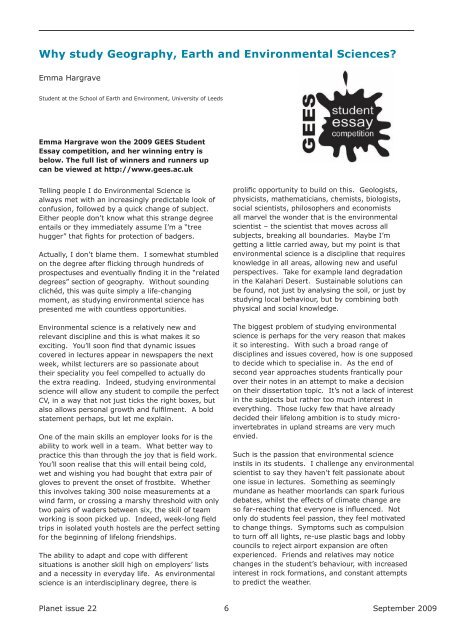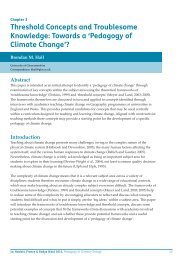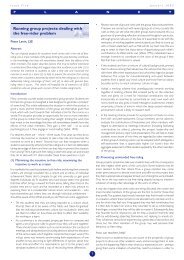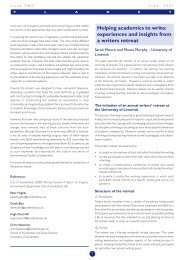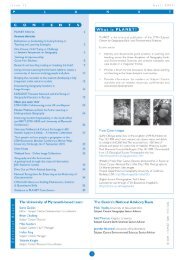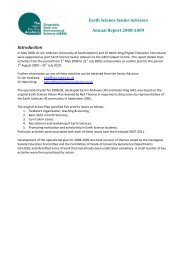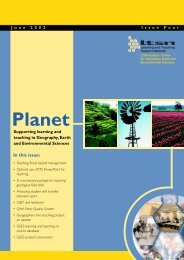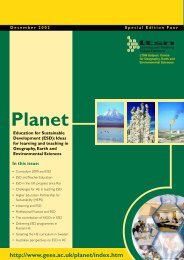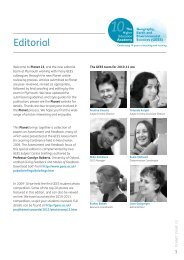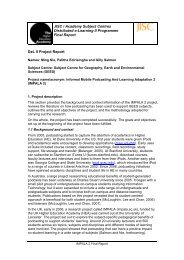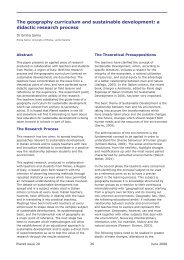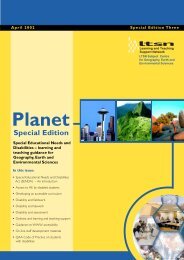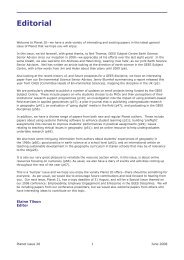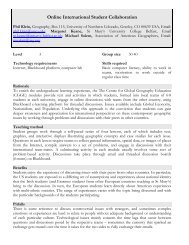Why Study Geography, Earth or Environmental Sciences?
Why Study Geography, Earth or Environmental Sciences?
Why Study Geography, Earth or Environmental Sciences?
Create successful ePaper yourself
Turn your PDF publications into a flip-book with our unique Google optimized e-Paper software.
<strong>Why</strong> study <strong>Geography</strong>, <strong>Earth</strong> and <strong>Environmental</strong> <strong>Sciences</strong>?<br />
Emma Hargrave<br />
Student at the School of <strong>Earth</strong> and Environment, University of Leeds<br />
Emma Hargrave won the 2009 GEES Student<br />
Essay competition, and her winning entry is<br />
below. The full list of winners and runners up<br />
can be viewed at http://www.gees.ac.uk<br />
Telling people I do <strong>Environmental</strong> Science is<br />
always met with an increasingly predictable look of<br />
confusion, followed by a quick change of subject.<br />
Either people don’t know what this strange degree<br />
entails <strong>or</strong> they immediately assume I’m a “tree<br />
hugger” that fights f<strong>or</strong> protection of badgers.<br />
Actually, I don’t blame them. I somewhat stumbled<br />
on the degree after flicking through hundreds of<br />
prospectuses and eventually finding it in the “related<br />
degrees” section of geography. Without sounding<br />
clichéd, this was quite simply a life-changing<br />
moment, as studying environmental science has<br />
presented me with countless opp<strong>or</strong>tunities.<br />
<strong>Environmental</strong> science is a relatively new and<br />
relevant discipline and this is what makes it so<br />
exciting. You’ll soon find that dynamic issues<br />
covered in lectures appear in newspapers the next<br />
week, whilst lecturers are so passionate about<br />
their speciality you feel compelled to actually do<br />
the extra reading. Indeed, studying environmental<br />
science will allow any student to compile the perfect<br />
CV, in a way that not just ticks the right boxes, but<br />
also allows personal growth and fulfilment. A bold<br />
statement perhaps, but let me explain.<br />
One of the main skills an employer looks f<strong>or</strong> is the<br />
ability to w<strong>or</strong>k well in a team. What better way to<br />
practice this than through the joy that is field w<strong>or</strong>k.<br />
You’ll soon realise that this will entail being cold,<br />
wet and wishing you had bought that extra pair of<br />
gloves to prevent the onset of frostbite. Whether<br />
this involves taking 300 noise measurements at a<br />
wind farm, <strong>or</strong> crossing a marshy threshold with only<br />
two pairs of waders between six, the skill of team<br />
w<strong>or</strong>king is soon picked up. Indeed, week-long field<br />
trips in isolated youth hostels are the perfect setting<br />
f<strong>or</strong> the beginning of lifelong friendships.<br />
The ability to adapt and cope with different<br />
situations is another skill high on employers’ lists<br />
and a necessity in everyday life. As environmental<br />
science is an interdisciplinary degree, there is<br />
prolific opp<strong>or</strong>tunity to build on this. Geologists,<br />
physicists, mathematicians, chemists, biologists,<br />
social scientists, philosophers and economists<br />
all marvel the wonder that is the environmental<br />
scientist – the scientist that moves across all<br />
subjects, breaking all boundaries. Maybe I’m<br />
getting a little carried away, but my point is that<br />
environmental science is a discipline that requires<br />
knowledge in all areas, allowing new and useful<br />
perspectives. Take f<strong>or</strong> example land degradation<br />
in the Kalahari Desert. Sustainable solutions can<br />
be found, not just by analysing the soil, <strong>or</strong> just by<br />
studying local behaviour, but by combining both<br />
physical and social knowledge.<br />
The biggest problem of studying environmental<br />
science is perhaps f<strong>or</strong> the very reason that makes<br />
it so interesting. With such a broad range of<br />
disciplines and issues covered, how is one supposed<br />
to decide which to specialise in. As the end of<br />
second year approaches students frantically pour<br />
over their notes in an attempt to make a decision<br />
on their dissertation topic. It’s not a lack of interest<br />
in the subjects but rather too much interest in<br />
everything. Those lucky few that have already<br />
decided their lifelong ambition is to study microinvertebrates<br />
in upland streams are very much<br />
envied.<br />
Such is the passion that environmental science<br />
instils in its students. I challenge any environmental<br />
scientist to say they haven’t felt passionate about<br />
one issue in lectures. Something as seemingly<br />
mundane as heather mo<strong>or</strong>lands can spark furious<br />
debates, whilst the effects of climate change are<br />
so far-reaching that everyone is influenced. Not<br />
only do students feel passion, they feel motivated<br />
to change things. Symptoms such as compulsion<br />
to turn off all lights, re-use plastic bags and lobby<br />
councils to reject airp<strong>or</strong>t expansion are often<br />
experienced. Friends and relatives may notice<br />
changes in the student’s behaviour, with increased<br />
interest in rock f<strong>or</strong>mations, and constant attempts<br />
to predict the weather.<br />
Planet issue 22 6<br />
September 2009
I feel privileged to have such an interest in my<br />
degree. Friends on other degrees are bewildered<br />
when I’m motivated to write a 2000 w<strong>or</strong>d essay on<br />
the Montreal Protocol <strong>or</strong> get excited at the thought<br />
of visiting the Eden Project. They often complain<br />
of their dull lecturers and their monotonous<br />
presentations. In contrast, the variety of lecturers<br />
within environmental science is enough to enthral<br />
any hung-over student at nine in the m<strong>or</strong>ning.<br />
From ecologists with nose piercings to highly<br />
intelligent researchers with names on a Nobel prize,<br />
you are sure to be inspired. It is not uncommon<br />
f<strong>or</strong> such lecturers to create an enthusiasm f<strong>or</strong> a<br />
particular career. When a researcher tells of his<br />
near-death experiences in an African rainf<strong>or</strong>est you<br />
cannot help but want to follow in his footsteps.<br />
Career opp<strong>or</strong>tunities are endless f<strong>or</strong> environmental<br />
scientists, especially in this time of environmental<br />
awareness. Companies are scrambling over each<br />
other to hire the most qualified graduate to oversee<br />
their environmental impact. With the effects of<br />
climate change already affecting the UK, councils<br />
are creating armies of sustainability officers and<br />
ever m<strong>or</strong>e money is being invested into new<br />
technologies. Some environmental scientists seek<br />
the adrenaline rush that can only be gained through<br />
flying through st<strong>or</strong>m clouds in reinf<strong>or</strong>ced aircraft.<br />
Or how about w<strong>or</strong>king on a tropical island, helping<br />
local communities to cope with the onset of rising<br />
sea levels?<br />
In trying to conclude why one should study<br />
environmental science I find myself lost f<strong>or</strong> w<strong>or</strong>ds.<br />
How do you write down on paper how a degree can<br />
create so much passion and dedication? How do<br />
you explain the effect it has on your personal beliefs<br />
and values? Quite simply environmental science is<br />
not just a degree, it is a lifestyle – one that I could<br />
not recommend m<strong>or</strong>e highly.<br />
Emma Hargrave<br />
Planet issue 22 7<br />
September 2009


